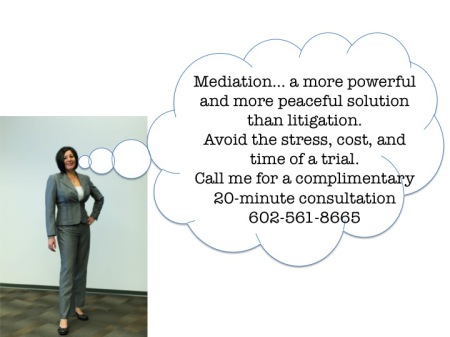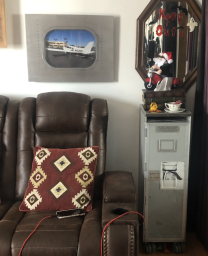
A settlement of a dispute or controversy by setting up an independent person between two contending parties in order to aid them in the settlement of their disagreement.
Source: legal-dictionary.thefreedictionary.com/mediation
What is mediation?
Mediation is used to settle disputes. When two people are unable to settle a dispute, they will often use mediation in order to reach an agreement. When the two people agree to use mediation, a neutral third party (also known in the industry as a mediator) will work with the two people in dispute in order to negotiate and develop a settlement agreement.
Mediation is a form of alternative dispute resolution (ADR). It is used in a variety of domains, such as commercial, legal, diplomatic, workplace, community, and family matters.
The mediation process is private and confidential, possibly enforced by law. Participation is typically voluntary.
What is a Mediator?
A mediator is a neutral third party who is selected by the people in dispute to help settle a dispute. Both people mutually select the mediator. A mediator does not need to be a lawyer but is often an expert in the field in which the two people are claiming a dispute.
Mediators use various techniques to open, or improve, dialogue and empathy between the two people in dispute, aiming to help them reach an agreement.
What is a mediation hearing?
Once the two people in dispute agree on mediation, they select a mediator. The mediator will then conduct a mediation hearing. During a hearing, both people may be brought together in order to work on an agreement or a mediator may use shuttle diplomacy. Shuttle diplomacy is a technique used by a mediator where she goes back and forth between the two people with proposals in order to reach an agreement. If an agreement is made, the two people will sign a settlement agreement.
What is a settlement agreement?
As a result of mediation the two people may decide to resolve their dispute. The terms of agreement are listed in a settlement agreement and the two people in dispute sign the written agreement. Typically, the mediator facilitates the agreement but does not sign the agreement.
What is the difference between litigation, arbitration and mediation?
Litigation is the process of going to court in order to solve a dispute. Going to court is usually a very costly and time-consuming process. The longer a dispute lasts, the more the two people pay in legal fees. Also, because a judge and/or jury hear litigation it is considered a public matter and is open to the public. The judge and/or jury make the decision that resolves the dispute not the two people in dispute.
Arbitration utilizes a neutral third party to hear a dispute between two people. The hearing is informal and the two people mutually select the arbitrator. The arbitrator is retained to decide how to settle the dispute and the decision is final and binding on the parties. Arbitration is more cost efficient and quicker than litigation but it is the arbitrator, not the two people, who renders the terms and conditions of the dispute resolution.
Mediation is a much quicker process than litigation or arbitration. The two people also have more control over the final resolution. The two people mutually select the mediator and the mediator helps the people resolve the dispute in a cost efficient manner.
What are the benefits of mediation?
Cost: While a mediator may charge a fee comparable to that of an attorney, the mediation process generally takes much less time than moving a case through standard legal channels. A case in the hands of a lawyer or a court may take months or years to resolve. Mediation, on the other hand, usually achieves a resolution in a matter of hours. Taking less time means expending less money on hourly fees and costs.
Confidentiality: While court hearings are public, mediation remains strictly confidential. No one but the parties to the dispute and the mediator know what happened. Confidentiality in mediation is so important in the legal system that a mediator cannot be forced to testify in court as to the content or progress of mediation. Many mediators actually shred their notes taken during mediation once that mediation has finished. The only exceptions to these confidentiality rules usually involve child abuse or threatened criminal acts.
Control: Mediation increases the control the people have over the resolution. In a court case, the people obtain a resolution, but control resides with the judge or jury. Often, a judge or jury cannot legally provide solutions that emerge in mediation. So, mediation is more likely to produce a result that is more creative and mutually agreeable for the people.
Compliance: In mediation, the two people in dispute work together toward a mutually agreeable solution. Thus, compliance with the mediated agreement is usually high. This further reduces costs because the two people do not have to employ an attorney to force compliance with the agreement. However, the mediated agreement is still fully enforceable in a court of law.
Mutuality: The two people in dispute are typically ready to work mutually toward a resolution. In most cases, since these two people are willing to mediate means that they are ready to “move” their position. This means that these people are more amenable to understanding the other person’s side and work on underlying issues to the dispute. This has the added benefit of often preserving the relationship these people had before the dispute.
Support: Mediators are trained in working with difficult situations. As a neutral facilitator, the mediator guides the two people through the process, helping them to “think outside the box” for possible creative solutions.
Disputes involving neighbors often have no official resolution mechanism. Community mediation focuses generally on such neighborhood conflict.
Community mediation is applicable to disputes in many areas such as:
- School conflicts
- Violence-prevention
- Victim-offender mediation
- Non-profit organizations
- Faith communities
A great variety of disputes occur in the workplace. These include disputes between staff members, allegations of harassment, contractual disputes and workers compensation claims.
Typically, workplace disputes are between people who have an ongoing working relationship within a closed system. This makes mediation highly appropriate as a method of dispute resolution due to the complexity of these relationships, involving hierarchy, job security and competitiveness.
How family mediation can help you
Family mediation helps families in conflict understand and communicate with each other better so they can make practical plans for the future. The trained mediator understands the complexity of family life, separation, divorce and family restructuring. She will not take sides, make judgments or give guidance. She works with families in conflict to help them communicate more effectively with one another and consider options that will help them work through their differences.
Mediation can help minimize conflict, improve family life and help avoid long, painful and expensive legal battles. If you do go to court, even at that stage you might be first encouraged to attend a mediation service.
I can help you
Family breakdown is distressing. It can be hard to keep communication channels open with family members when you are in crisis. I am here to help you make your own decisions about the future when you most need support and understanding.
Family mediation is applicable to disputes in many areas such as:
- Prenuptial / Premarital agreements
- Financial or budget disagreements
- Separation
- Divorce
- Alimony
- Parenting plans (for child custody and visitation)
- Eldercare
- Family businesses
- Adult sibling conflicts
- Parents/adult children conflicts
- Estates
- Medical ethics and end-of-life
Contact Me
Sarah Nilsson, J.D., Ph.D., MAS
602 561 8665
You can also fill out my
Get Social with Me
Legal Disclaimer
The information on this website is for EDUCATIONAL purposes only and DOES NOT constitute legal advice.
While the author of this website is an attorney, she is not YOUR attorney, nor are you her client, until you enter into a written agreement with Nilsson Law, PLLC to provide legal services.
In no event shall Sarah Nilsson be liable for any special, indirect, or consequential damages relating to this material, for any use of this website, or for any other hyperlinked website.
Steward of
I endorse the following products
KENNON (sun shields)




















